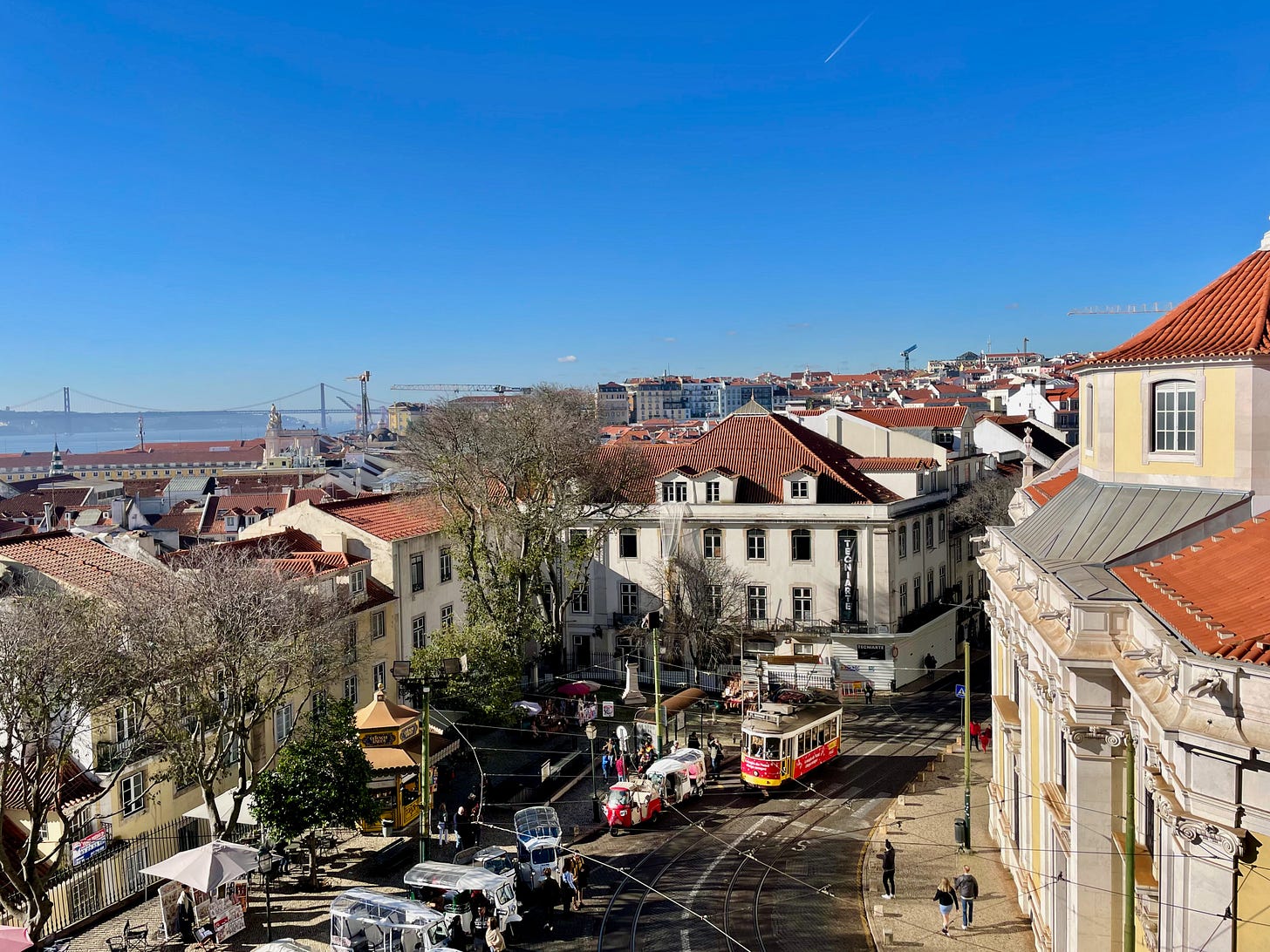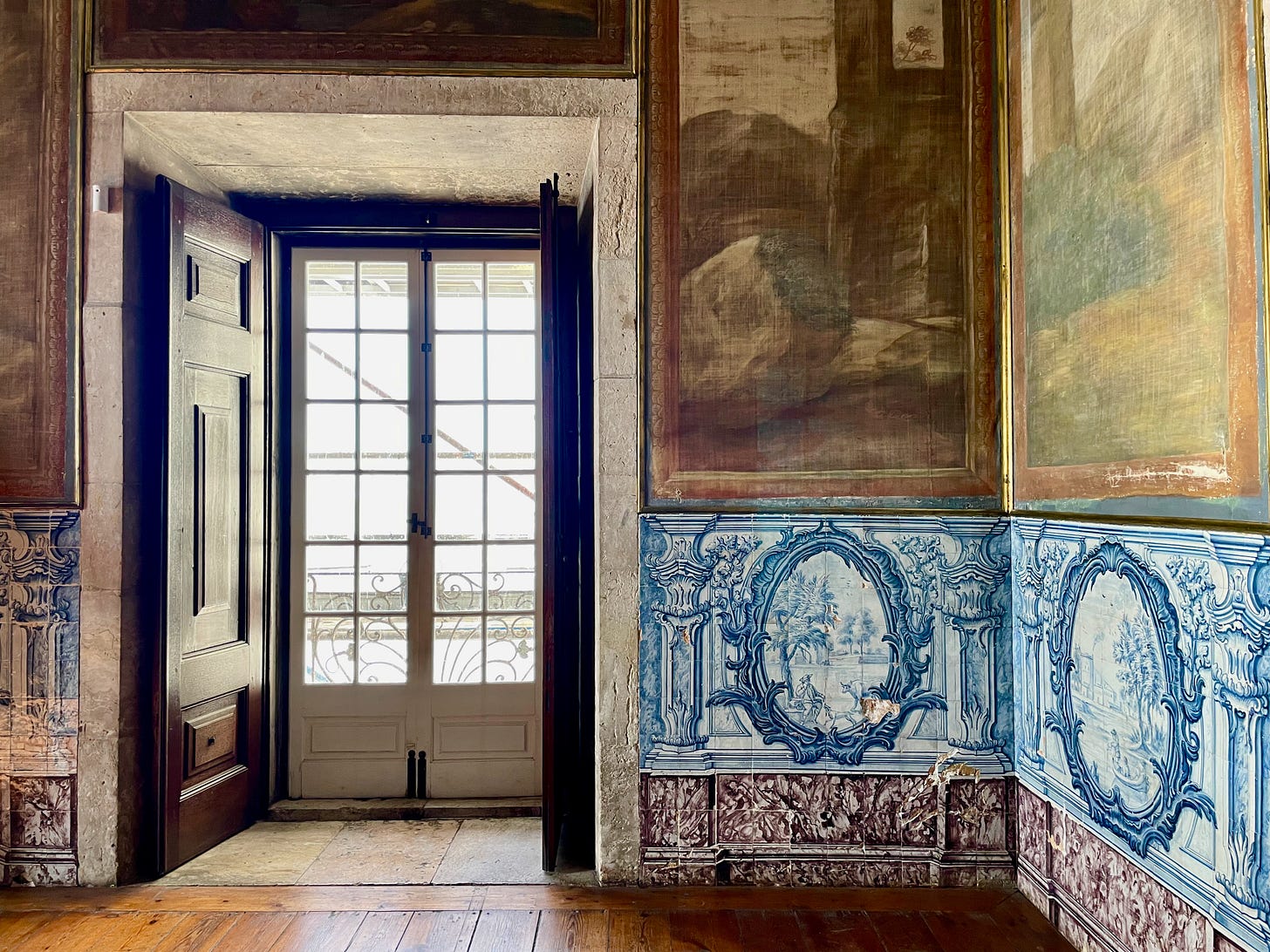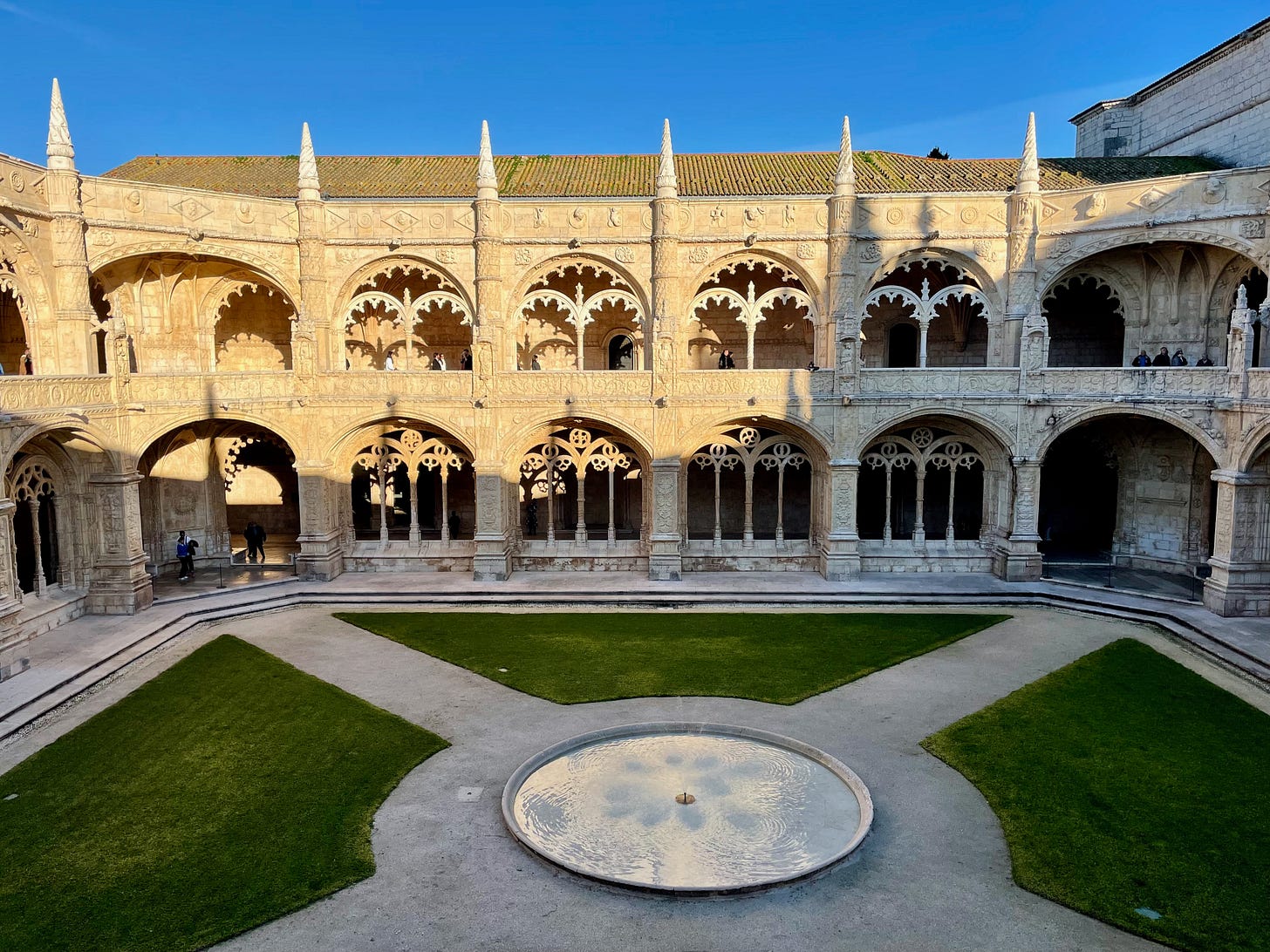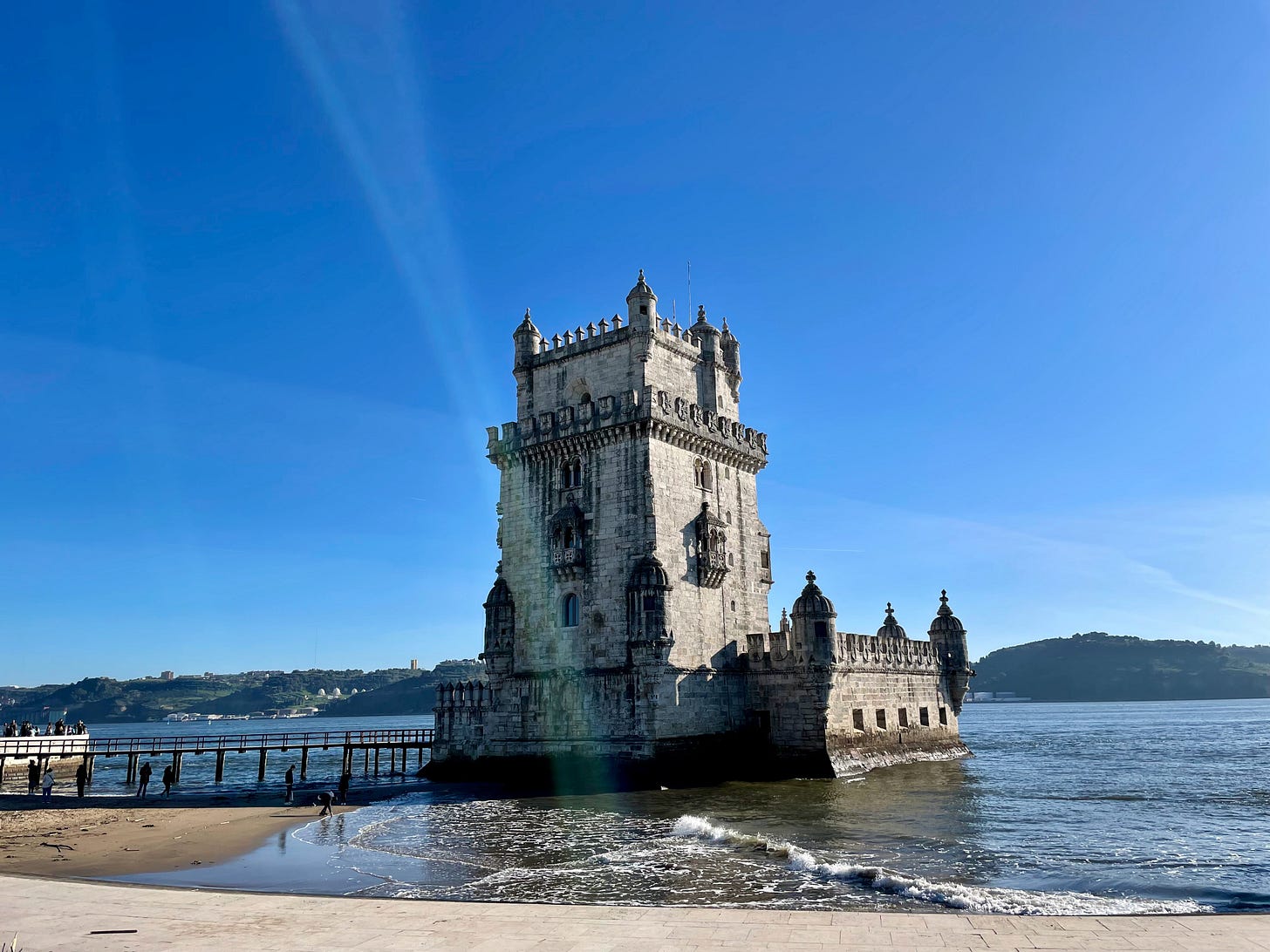Portuguese Fado, A Bewitching Experience I'll Never Have Again
ruining the past by trying to relive it
Hello, friends! Happy Tuesday.
I sense that I’m not the only one who had a wonky start to 2023. I hope those of you who were in the same boat as me have finally settled into a good rhythm, as I have. As a New Year’s resolution of sorts, Nick and I have started setting aside an hour after dinner for “activity time,” where we work on hobbies and personal projects. It keeps us from vegging out in front of the TV, and it feels nice to end the day with something that’s both pleasurable and productive.
Over the holiday weekend, we ate at Khufu’s, a new Egyptian restaurant in the pyramids complex. The food was decent, but the view was stellar (are you sick of seeing pictures of the pyramids yet??):
This week’s essay is about the danger of trying to relive cherished moments, interspersed with more of my favorite photos from Portugal. What experiences do you cherish, and given the chance, would you try to repeat them?
Have a wonderful week,
Sam
When I was in college and my wanderlust at its height, a well-traveled professor told me that you can never truly go back a place. If you return somewhere in an attempt to relive moments etched in your memory, you will find it isn’t quite as you recall. It could be something obvious that’s changed—a storefront has turned over, a fallen tree has left a blank space on the horizon, a loved has one moved away—or it could be something intangible, like a difference in the quality of light or the way the wind moves through your hair, which makes everything feel peculiar. The places you’ve been tend to move on without you.
I’ve always carried that wisdom with me. But some experiences are so enchanting they make us forget what we think we know, and the fado music of Lisbon made me forget this simple truth.
Fado is meant to evoke saudade, a Portuguese concept without English equivalent: a nostalgic yearning for something or someone that has been lost and may never be found, or perhaps was never real at all. Because a hopeless romantic hides beneath my pragmatic exterior, I couldn’t leave Lisbon without hearing live fado, but I wasn’t certain I would like it. I imagined it might be maudlin to the point of ridiculousness. Another small part of me feared I wasn’t ready for tales of things loved and lost. I’d had enough of those feelings since my father died, and I knew I would recognize their reverberation in the songs even if I didn’t understand the words. Still, I reserved a table at one of Lisbon’s many fado houses and walked toward it with my husband on a chilly night, through the black-and-white tiled streets of downtown.
Set on a wide pedestrian alley, the restaurant’s neon sign beckoned us. Our server whisked us inside and gave us the rules: you must order quickly because there will be no food or drink service during the fado show, and once the fadistas begin to play, you must be absolutely silent. We were about to witness something sacred, and would have to give it due reverence. We hastily ordered a charcuterie—slices of melt-in-your-mouth pork and soft, creamy cheeses to spread over homemade bread—which we wolfed and washed down with cocktails. As we finished our meal, the lights began to dim.
Two solemn men took to folding chairs beneath an arch in the center of the floor, each facing the other with a steel-stringed guitar on his lap. The room hushed, and they began to play a bouncy, wistful folk tune. Their plucks had a sparkling resonance that was somehow fluid and staccato all at once, and any doubts I’d had about fado faded out with their final notes. I loved this. I was ready for this. I could listen to this all night.
Then a singer joined the guitarists. She roamed between tables, crooning songs of saudade with a slightly throaty rasp, making eye contact with each guest. Her black leather pants and fishnet top would have been cliché on a punk rocker, but worn by a folk singer, they created a juxtaposition that captivated me. I noticed myself smiling at her through tears, and rubbing the goosebumps on my forearms to smooth them. Rapt faces flickered in the candlelight across the room.
A handful of tables emptied when the fadistas broke for dinner, but we never considered leaving. We lingered for three hours, sipping tawny port between ballads and savoring a rich, fluffy chocolate cake with fresh cream, until the show closed with a spirited piece about lovers’ lies (“É mentira! Mentira! Mentira!”) The musicians raised their glasses to us as they filed out, and we whispered our thanks.
The following evening we left for the Algarve, where despite the arresting beauty of the sea cliffs, my mind kept creeping back to that little café in Lisbon. In my head I could hear the silvery strum of the guitar, yet I couldn’t discern the melodies. I longed to hear them again. We planned to return to the city for one more day before flying home, and I asked my husband what he would think of going back to the fado house for our last dinner in Portugal.
He took no convincing. A few nights later, we walked once more to the restaurant, this time through rainy, abandoned streets. When we arrived, there was something different in the atmosphere. There were more tables than before, and the diners were packed in like the canned sardines the Portuguese love so religiously. Our charcuterie board was paltry in comparison to what it had been a few nights prior; the cheese was too soft, the bread’s crust too pale.
As the lights dimmed for the show, our fellow patrons seemed oblivious, and they refused to be silent. Forks scraped, wine glasses clanked, whisper-shouts hissed across tables. Only one of the original guitarists had returned. The singer was too traditional and folksy and congruous to be interesting. I tried to summon images of that first night of fado and to hold them in my mind’s eye, hoping to prevent them from being overwritten by the inferior ones I was witnessing, but knowing the two would always be enmeshed.
I squirmed in my seat, defeated. I’d bastardized a memory by attempting to relive it. We slipped out of the restaurant before the final act, and I chastised myself for my arrogance as we walked back to our hotel. I should have known better than to try and reenact the past. I had been greedy when I should have been grateful.
We left Portugal in the wee hours of the next morning, and I took with me the most fitting souvenir: my own little piece of saudade, a bittersweet longing for that first night of fado and the table to which I can never return.
Elsewhere
If you’re interested in hearing fado yourself, here is a clip of the one song that is seared in my memory from our live fado experience:
I have a soft spot for Lyon and its delicious regional cuisine, but I have yet to try mâchon—a traditional breakfast of wine and organ meats, and a custom that locals are working to preserve and modernize. [BBC Travel]
An idea I find myself increasingly drawn to: walking the camino de Santiago pilgrimage trail. [Travel Curator]
P.S.—have you tried The Sample? It sends you samples of newsletters curated for your interests, and you can subscribe to the ones you like with a single click. If you sign up using this referral link, The Sample will send The Cairo Dispatch to 100 of its users, which will help me grow—win-win!













Thank you for the sharing the gift of your evocative writing. This made me want to reread a poem: Fado, by Jane Hirshfield.
This reads like a dream, like maybe that first night never happened in this realm - but good reminder overall that nothing can be replicated. Also your desire to walk the camino reminded me of one of Juan's most favorite movies, beyond Princess Bride ha,, was a movie called The Way, produced and written by Emilio Estevez. Maybe you'd like it: https://en.wikipedia.org/wiki/The_Way_(2010_film)